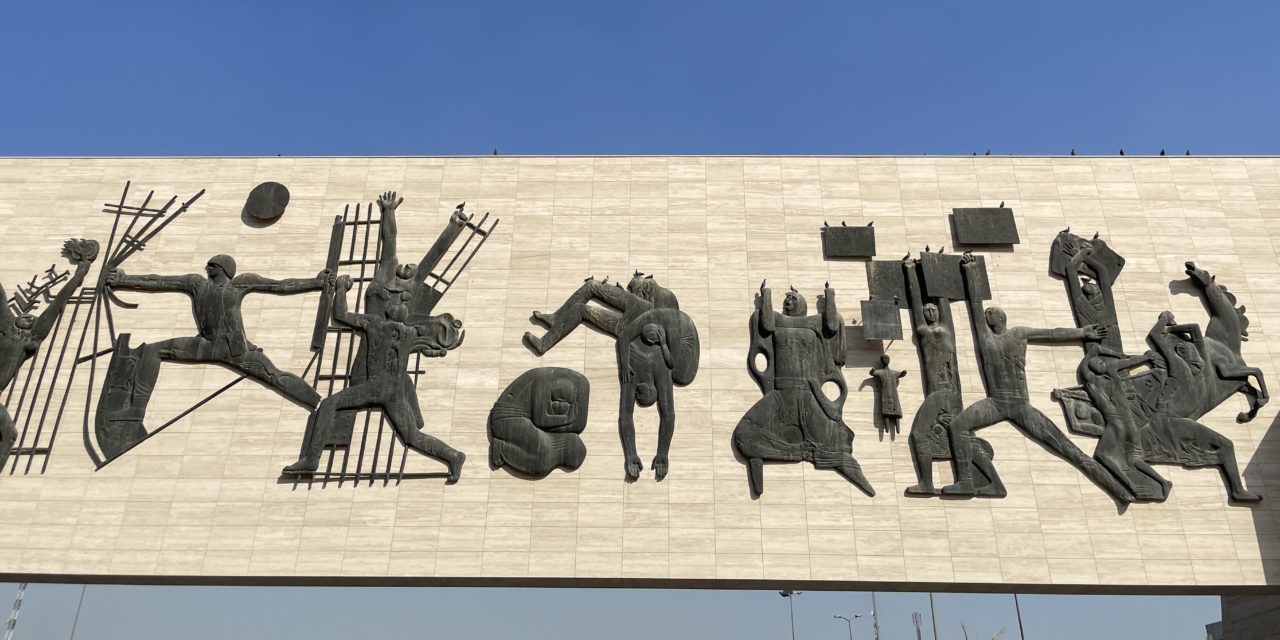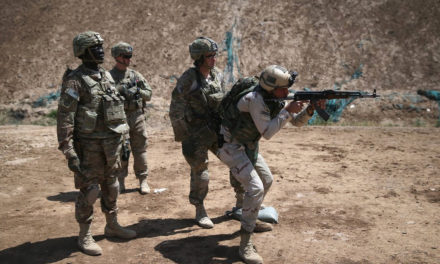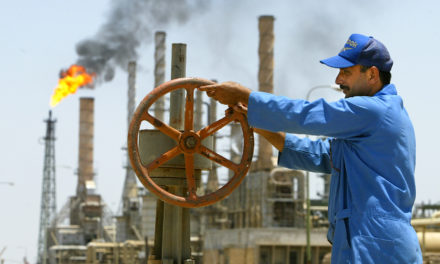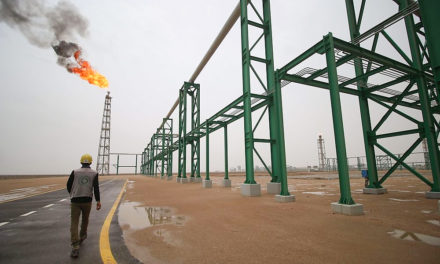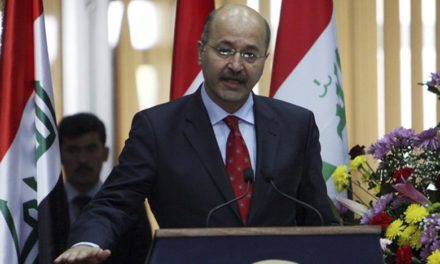Over the course of my fieldwork in Iraq, I have noticed a shift in public political discourse, especially on religion and state relations. Certain phrases have appeared in the daily vernacular, some borrowed from Western academia discourse, such as defining the state as holding a monopoly on violence, and others developed locally, such as using the term “madani” to describe a type of government or a political outlook. In everything but politics, madani in Arabic translates to “civil” (as in, civil society) but in politics it can convey aspects of nationalism, rule of law, and even secularism. The term emerged in reaction to religious forces in society, such as Islamist parties and religiously themed paramilitary groups. The local development and fixation on such words and phrases reflects the specific ways in which Iraqis are grappling with their political system twenty years after the invasion.
Defining the Terms
Popularized by the Arab Spring, the term madani was crafted to evoke an ideal state promoting justice and equality while separating religion from politics, but without using the Arabic word for “secular,” which – in Iraq and in the region – is regarded as synonymous with atheism. In effect, the term was adopted to not alienate a conservative society. An analyst at the Carnegie Middle East Center defines a madani state as one “governed by constitutions and laws that guarantee individual freedoms as well as the freedoms of all components of society.” Additionally, he highlights that it is not a religious state (explicitly referring to Iran). Other descriptions of the madani state from Middle Eastern and Iraqi writers use similar language, stressing the importance of institutions, inclusivity, the rule of law, and the rejection of religious or tribal intervention. Many of Iraq’s protest-based parties describe themselves as madani.
Religion and the State in Iraq
The development of this idea in Iraq reveals multiple layers of tensions, negotiations, and even contradictions occurring in the public sphere. It also raises questions about how a representative and inclusive democracy develops in a diverse but predominantly Muslim country, and in the presence of dominant and pervasive Western ideas of statehood and democracy. In Iraq, unlike the rest of the Middle East, these ideas are not just spread through media and conditional aid funding, but also through the country’s institutions – the constitution, electoral mechanisms, and laws – that were established, advanced, or encouraged by the American-led occupation.
One aspect of this institutional legacy is how religion is featured in state discourse. For example, Islam is “a source of legislation” in the Iraqi constitution, and Islamist parties have remained the dominant political players since the first parliamentary election in 2005. The most powerful religious actor in Iraq is the Shia religious establishment, the Marjayya, with its headquarters in the holy city of Najaf. Led by Grand Ayatollah Ali Al-Sistani, the Marjayya has exercised its influence episodically since 2003. Its most direct relationship with the state is through the religious endowments – independent commissions responsible for overseeing religious spaces. The head of the Shia Endowments Commission (there is also the Sunni Endowments Commission, as well as the collective Christian, Yazidi, and Sabean-Mandaean Endowments Commissions) is designated by Grand Ayatollah Sistani, making this a clear case of devolving a significant government institution to religious actors.
A Crisis of Trust in Religious Leadership
Public perception of these endowments as complicit in Iraq’s widespread corruption has stained their reputation. The Shia religious establishment faces additional pressures from the public, due to its perceived role in enabling Islamist parties and in sanctifying the creation of paramilitary groups. The Sunni religious establishment likewise faces a crisis of trust due to the experience of the ISIS incursion. Although measuring clerical influence is complicated, there is enough public opinion data to suggest that Iraqis would at least like to see less clerical intervention in politics.
A recent report documents that from 2004 to 2011, there was a 15 percent increase in those who believed that “Iraq would be a better society if religion and politics were separated”. Further polling from the Arab Barometer shows that this trend continues to at least 2018. Similarly, there is an increase in the number of Iraqis who believe that religious leaders should not interfere in politics aligning with the preferences expressed by citizens of other countries in the region like Turkey, Lebanon, and Egypt.
As a result, when the October Protest Movement erupted in 2019, the Shia religious establishment used it as an opportunity to rehabilitate their reputation by using their pulpit to protect protestors and to ensure a peaceful outcome. In turn, protestors – even professedly secular ones – turned to the religious establishment for legitimation and support, likely due to the scarcity of viable leadership in Iraq.
The complexity of religion and politics in Iraq is reflected in the tensions of the protest movement itself. Shia religious symbolism was ubiquitous in the protest squares, which spread across Baghdad and the Shia-majority southern governorates. The juxtaposition of the protest movement’s anti-Islamist demands against this symbolic backdrop is not necessarily contradictory but speaks to how the struggle for a nation’s identity plays out as a contest to project one’s cultural symbolism onto the nation.
Religious symbolism is part of Iraq’s national identity, a fact that activists must grapple with when defining a madani state and a secular state. Even in Iraqi Kurdistan, which is perceived as being the most culturally liberal area, markets are closed on Fridays, and the Prophet’s birthday is celebrated in the ancient Assyrian citadel at the center of Erbil.
The Compatibility Question
Iraq’s civil society elites who dream, write, and advocate for a madani state are struggling with how to reconcile cultural and religious capital with the ideal state. In their circles, there is a polarization of identity, where religious practice is seen as diametrically opposed to and even incompatible with the tenets of the protest movement and the madani state. They describe themselves as madani and liberal almost synonymously, with an emphasis on the rejection of certain Muslim religious practices like praying, fasting, or avoiding alcohol. Implicit in this description is the assumption that personal piety may be incompatible with a secular political outlook. I recall an Iraqi civil society activist who was surprised at my not being an Islamist despite what he described as my “Islamist look”, simply referring to wearing a hijab. For these elite activists, the term madani is a necessary concession to a conservative society, including many of the protestors themselves. In many ways, these advocates are the inheritors of the Iraqi Communist Party, whose avowedly secular outlook prompted the widespread perception that secularism is atheism.
This belief is prevalent among the upper classes and is highly reminiscent of a now relegated debate in the West of whether Western Muslims could uphold the values of a liberal democracy. To do so, must they separate their personal identity from their political identity or can the two go hand-in-hand? The experience of Muslim-majority democracies like Indonesia and Muslims in the West dismisses the idea that Islam and democracy are incompatible. However, the issue is that liberalism and democracy do not always go together, as Shadi Hamid discusses in his recent book.
Developing the Madani State in Iraq
Perhaps the development of the term madani reflects the pursuit of an organic Middle Eastern or Iraqi democracy, a desire to reconcile aspects of a conservative society with aspirations for a more pluralistic, free, and representative state. This effort is still in its formative and exploratory stages. What distinguishes Iraqi civil society from many of its counterparts in the region is that Iraq has an existing mechanism for exploring and implementing a vision for the state: elections. After the protest movement, different madani parties erupted throughout the political landscape, maintaining varying relationships with the religious establishment and varying perceptions of a madani state.
For many of these aspiring political leaders from the protest movement and from civil society, the task at hand is to figure out how to package and sell the madani state to Iraqi society. On one hand, they can appeal to the public’s clear disenchantment with religious leaders and with their role in political life. On the other hand, how will they design policies that appeal to a society that is still largely conservative and whose cultural, religious, and national symbolism is deeply intertwined? This task itself is an exercise in developing the Iraqi madani state.
This essay is part of a special series – Iraq after 2003: The Voices of Iraqi Women
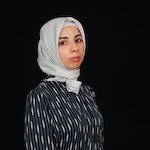
Marsin Alshamary
Marsin Alshamary is an Iraqi political scientist and a research fellow with the Middle East Initiative at the Harvard Kennedy School. She is also a non-resident fellow at the Brookings Institution. Her research examines the intersection of religion, protest, and civil society in Iraq. She is an incoming assistant professor at Boston College and holds a PhD from MIT.

